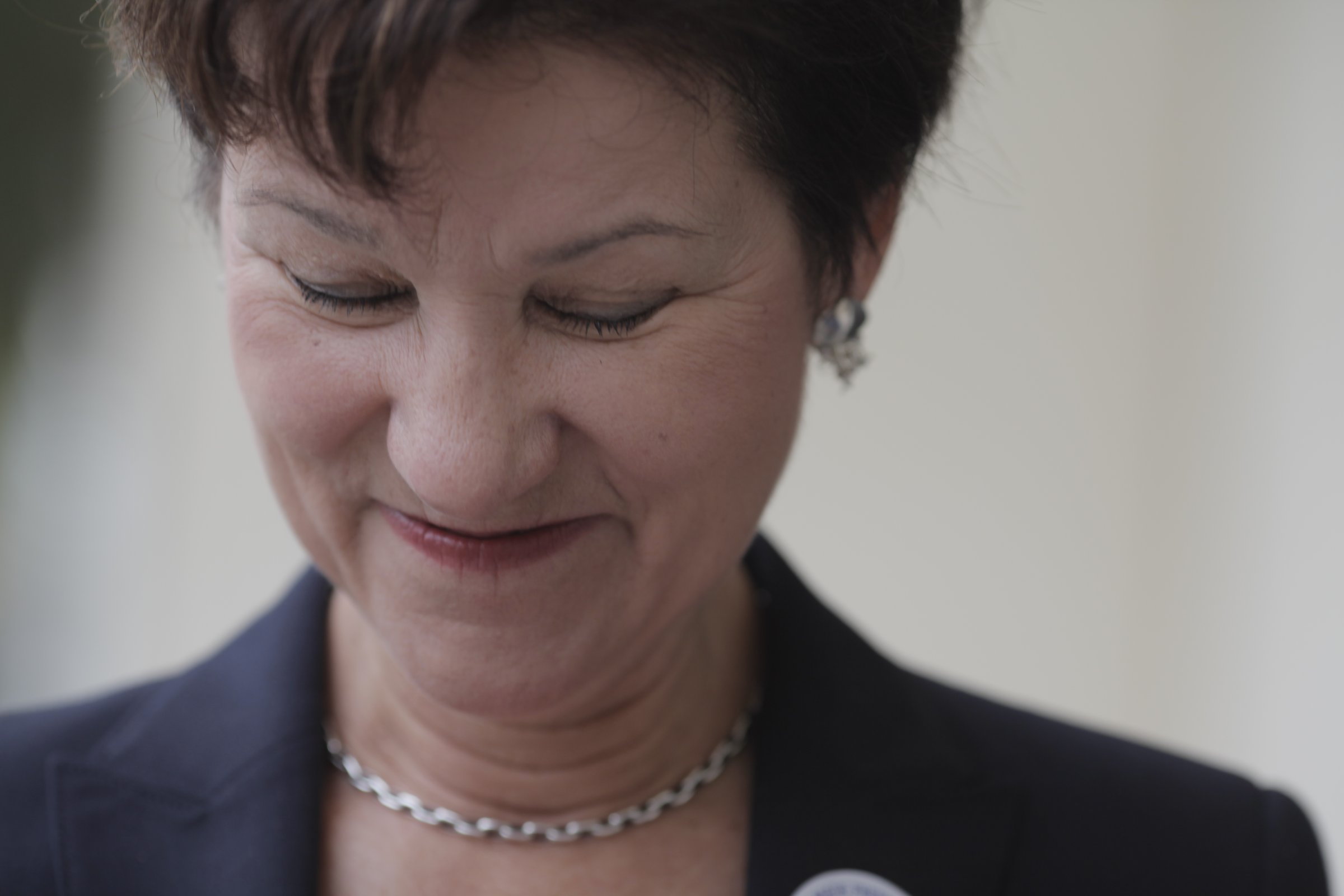
Standing in front of two-dozen seniors at the Whispering Waters condos in St. Petersburg, Fla., Alex Sink made her pitch last month for why voters should send her to Congress in the coming special election to fill the seat of deceased Republican Rep. Bill Young.
“We need more bipartisan problem solvers in Washington who will bring Republicans and Democrats together to get Congress focused on solving challenges that matter,” the former Florida chief financial officer told the crowd as they sipped paper cups of coffee on Feb. 20. “I look forward to serving as a strong and passionate advocate who will take the voices of Pinellas women to Congress.”
Then she dug in at her opponent in the March 11 special election, Republican David Jolly. “Washington Lobbyist David Jolly supports overturning Roe v. Wade and said he ‘personally opposes’ Paycheck Fairness,” she said.
These are points Sink never fails to make on the campaign trail. Her theme—that women are better represented by Democrats—is a preview of the campaign motif Democrats hope to run all over the country in November. House and Senate Democrats are betting on a women’s economic agenda, focusing on Democratic initiatives like equal pay for women, extending unemployment insurance and raising the minimum wage, to help raise their sinking prospects this fall. At the same time, they’re pounding Republicans for waging a “war against women,” highlighting what they call extreme GOP stances on abortion and rape.
“Every poll I look at shows that a vast majority of women believe that House Republicans are vastly out of touch,” says Rep. Steve Israel of New York, chairman of the Democratic Congressional Campaign Committee, which works to elect Democrats to the House. “The reasons are clear: They have consistently attacked women’s health, they have consistently blocked equal pay for women, and they even blocked the Violence Against Women Act. These are defining issues and we will continue to hold House Republicans accountable for their negligence.”
The hope is that if just one demographic, single women, turns out at the same levels they do in presidential election years, Democrats could win back the House and save their Senate majority. In 2008, Barack Obama won the White House with the support 56% of women, including 58% of single women and 51% of married women, according to CNN exit polls. But in the 2010 elections, Democrats narrowly lost women to the GOP, 49% to 48%; CNN did not break out single versus married women this cycle. In 2012, Obama lost married women to Mitt Romney 46% to 53%, but won women overall on his strength with single women, which he won with 67% of the vote to Romney’s 31%.
The attack strategy worked well for Democrats in 2012 when Republicans lost two key Senate races in Missouri and Indiana—and their chance at taking back the Senate majority—after Republican candidates made inflammatory comments on rape and abortion. “If GOP candidates continue to speak, or misspeak, in ways that suggest that they are completely out of touch with women’s equity and autonomy, then we could see Democratic successes in places where the fundamentals favor the Republicans,” says Jennifer Lawless, a political science professor at American University who focuses on women in politics.
Last year, Virginia Democrat Terry McAuliffe focused on women’s economic issues, while benefiting from hundreds of pro-choice ads run on his behalf by women’s groups slamming his gubernatorial opponent, Ken Cuccinelli, for his pro-life without exceptions stance on abortion. McAuliffe beat Cuccinelli on the back of the women’s vote, which broke for McAuliffe 54% to 38%, with single women making up nearly 20% of the voting electorate. “In 2012, and with the recent gubernatorial race in Virginia, Democrats targeted women voters heavily and won so they will focus on abortion rights and income inequality,” says Michelle Swers, a political science professor at Georgetown who focuses on women’s issues. “Single women and minority women are among the most reliable voters for Democrats but they vote less in midterm years.”
Individual statewide races are one thing, but betting on turning out single women across the country is a long shot: Most expert observers don’t expect Democrats to take back the House, and the Senate is looking increasingly imperiled. Historically, the party in power doesn’t fair well in a President’s second term midterm elections, a phenomenon known as the “six-year itch.”
“The Republicans have the easier job since older voters, white evangelicals, and other GOP-leaning groups often account for a larger percentage of the midterm electorate than in presidential years,” says Larry Sabato, head of the University of Virginia’s Center for Politics. “The combination of inertia and habit can be broken, but it takes a lot of money and effort–and thus it is a rare occurrence.”
Perhaps then Sink, who is ahead of Jolly in most polls, and weak returns in the early vote, which usually skews heavily Republican, have not been a good indicator for Jolly, is the Democrat’s long awaited unicorn–or an outlier. For Democrats, Sink’s potential victory is a hopeful sign in what otherwise could be a brutal year. With Obamacare still deeply unpopular, Democrats are struggling in generic match-up polls against Republicans. A December CNN poll found that women disproportionately dislike Obamacare by 60%, up six points from a similar poll a month earlier.
All of which would make a Sink victory in a district held by Republicans since 1983 all the more meaningful.
More Must-Reads from TIME
- Donald Trump Is TIME's 2024 Person of the Year
- Why We Chose Trump as Person of the Year
- Is Intermittent Fasting Good or Bad for You?
- The 100 Must-Read Books of 2024
- The 20 Best Christmas TV Episodes
- Column: If Optimism Feels Ridiculous Now, Try Hope
- The Future of Climate Action Is Trade Policy
- Merle Bombardieri Is Helping People Make the Baby Decision
Contact us at letters@time.com